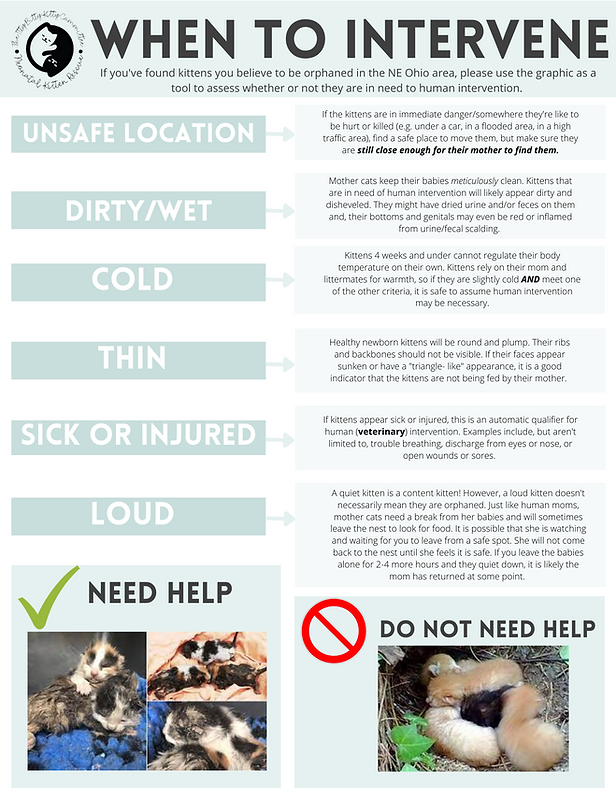.png)
FOUND KITTENS
A kitten’s chance of survival drastically plummets if they are taken away from their mom too soon, so it is absolutely critical to be 100% sure that the mom cat has actually abandoned them before removing them from where you found them.
The time between late spring and early autumn is known as “kitten season.” During this time of year, unaltered, outdoor cats (both owned and “community” cats) reproduce prolifically. It’s not uncommon to find a litter of kittens (or single kittens) under a bush, porch, or perhaps out in the garden with mom cat nowhere in sight. What do you do? Your first instinct may be to scoop them up and take them inside, or perhaps to your local shelter.
...PLEASE WAIT. The best thing for the kittens is most likely to leave them where they are. The mother offers her kittens the absolute best chance for survival, so WAIT and WATCH as long as you can.
Know that healthy kittens can survive several hours without food as long as they are warm. Neonatal kittens are much more at risk of hypothermia than they are of starvation. During ‘kitten season’ (typically during the late spring and summer months), waiting a longer time to see if mom will come back is usually very safe.
WHY SHOULD REMOVING NEONATAL KITTENS BE A LAST RESORT?
In most cases, removing the kittens away from where their mother is most likely going to return may end up putting them in even greater danger. Below are some of the the main reasons people use to justify prematurely taking kittens they find:
People prematurely remove kittens they believe to be orphaned with the preconceived idea that a "shelter will take them."
If you take motherless neonatal kittens to a shelter, they will be euthanized unless there is an experienced bottle feeder available. There are simply too many kittens and not enough time or resources to care for them. Neonatal kittens do NOT thrive in a shelter environment—even with a mom. Kittens that are this young have close to no immune system, so the risk of disease, illness, and stress-induced problems is unbelievably high. These factors often make tiny kittens the most at-risk animals for being euthanized in shelters.
People prematurely remove kittens they believe to be orphaned because they feel they are able to bottle feed.
Providing critical care to neonatal kittens is not a job for the average, compassionate—yet inexperienced—animal lover. It is an extremely difficult, time consuming, and expensive undertaking. Bottle feeding doesn't even scratch the surface of the care required to keep neonatal kittens alive. Even for the most experienced neonatal rescuer, mortality rates of orphaned neonatal kittens can range anywhere from 40%-70%.
While we love ALL cats, The Itty Bitty Kitty Committee operates on very limited space and only takes neonatal kittens. A neonatal kitten is a kitten that is at his or her tiniest (newborn to 3/4 weeks old).
When a mother cat is not around or able to care for kittens, these babies will require specialized, round-the-clock care if they have any shot at survival.
If you are not sure if you have found a neonatal kitten, use the graphics below as reference.


Orphaned neonatal kittens require immediate and urgent treatment and time is of the essence. If you have watched from a distance for at least 4-6 hours and the mother cat does not return and/or you are sure you have a kitten that is in need of help, please TEXT (if possible) the following information to the contact listed below:
-
Your location
-
Where is the mother cat? (i.e. not producing milk, deceased, hasn't been seen, etc.)
-
If you found kittens, please indicate approximately how long you have waited for mom to return.
-
How many kittens are in need of assistance?
-
Attach a picture if possible. Unless the exact date of birth of the kitten(s) is known, a picture is required before I'm able to intake.


